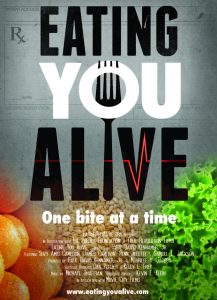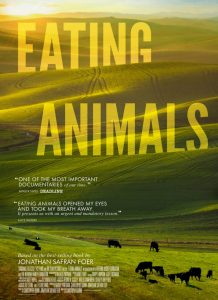When it was released in April, the feature-length documentary “Eating You Alive” screened in 569 theaters across the country, including three in Maine. It was featured on NBC’s “Today” show and on a number of local TV newscasts and newspapers. Now you can get it on DVD and via digital download.
“Eating You Alive” is one of several pro-vegan films filling the big screen in 2018.
The thought-provoking film showcases doctors, patients and celebrities who claim a switch to a vegan diet of whole, plant foods reverses chronic health problems including cancer, diabetes and heart disease. But, the film asserts, most doctors and hospitals continue to ignore this evidence despite decades of clinical data, scientific study and patient experience.
The film opens with two dire statistics from the American Institute for Cancer Research and Forbes, respectively: 30.4 million people around the world die each year due to chronic disease, while the country spends $3.8 billion on healthcare. These figures set the tone for the film.
In the film, Dr. Ron Weiss, a New Jersey internist, describes how his 69-year-old father was diagnosed with end-stage pancreatic cancer and informed he would be dead within three months. That dire diagnosis impelled Weiss to dive into the literature, where he read about using a plant-based diet to reverse cancer. Weiss showed the information to his father, who switched to plant-based food. His father’s health improved. A year later he went to see the doctor who had made the diagnosis, with his son, Dr. Weiss, in tow.
“He asked my father what he was doing there,” Weiss recounts in the film. “My father started to tell him about broccoli and brown rice, and the doctor lost complete interest in what my father was saying. That was the point, for me, that changed what I would do as a doctor.”
Directed by Paul David Kennamer Jr. and featuring Samuel L. Jackson and James Cameron, “Eating You Alive” is the latest in a popular vegan medical documentary sub-genre that includes “What the Health” (2017), “Plant PureNation” (2015), “Forks Over Knives” (2011) and “Fat, Sick & Nearly Dead” (2010). Near its end, the film demonstrates how to cook vegan Alfredo sauce, cauliflower hot wings and other easy vegan dishes. Then we see the film’s stars, former sufferers of chronic diseases, talk with evident emotion, crying in some cases, about how eating a plant-based, vegan diet improved their health and their lives.
The film closes with the assertion that in order to solve its healthcare crisis, America needs to move to a plant-based diet.

Another feature-length documentary, “Eating Animals,” opened in theaters in June and has screened around the country since, getting positive reviews from not only the New York Times and the Washington Post, but also the Kansas City Star, The Greensboro News & Record and the Billings Gazette.
The Boulder Weekly writes that the film “aims to illuminate the truth of the meat industry” and the Detroit News calls it a “solemn, tough viewing that examines the state of farming in America today.”
The closest “Eating Animals” will come to Maine is a screening Aug. 30 at 7 p.m. at the Music Hall in Portsmouth.
Directed by Christopher Dillon Quinn, produced and narrated by Natalie Portman and staring a cast of renegade farmers, “Eating Animals” is a loose adaptation of Jonathan Safran Foer’s 2009 best-seller of the same title. The film takes a philosophical rather than a medical approach and seeks to find an alternative to the scale and atrocities of factory farming.
The film centers on farmers who raise animals on pasture and otherwise buck the industrial farming system. But there is a sadness in these farmers, who ultimately must kill the animals they care for.
“Eating Animals” wraps with an indictment of the U.S. Department of Agriculture and a glimpse of the emerging vegan meat market. While its overall message is “eat less meat,” its heavy focus on pasture-based animal agriculture leaves crucial questions unanswered – such as whether eating pasture-raised animal flesh is any better for human health or if there is enough available land to swap concentrated animal feeding operations with sprawling free-range systems.

Director Quinn has been quoted as saying he didn’t want to make a pro-vegan or pro-meat film, yet Variety’s film reviewer said the work “leans, implicitly, toward the pro-meat argument.” I agree the film spends too much time highlighting alternative meat farmers and too little time investigating the growing market for vegan food.
However, in doing so the inherent cruelty of raising other beings to be killed and eaten – whether done in a factory or in a pasture – becomes visible. The film’s most hopeful moments are the ones spent exploring vegan meat.
Other vegan films headed for theaters include the feature-length documentary “Dominion,” which examines farm animal abuse in Australia. It recently began screening in select U.S. cities (but so far, none in the Northeast).
On Aug. 28, the feature “The End of Meat” by German filmmaker Marc Pierschel debuts in the United States with screenings in New York City and Los Angeles. The film explores what a vegan world would be like through the lens of Germany, where a higher percentage of the population is vegan.
Coming in October is “A Prayer for Compassion,” which asks religious and spiritual leaders from a broad range of faith traditions why they choose to eat vegan. It follows filmmaker Thomas Jackson across the country and world, including to a United Nations climate conference in Morocco. The documentary is produced by Victoria Moran, who runs Main Street Vegan and spoke at this year’s Maine VegFest.
A 12-minute digital short “ANIMA: Animals. Faith. Compassion.” was released this summer and covers similar ground. You can watch it for free on Vimeo.
“Game Changers,” is another pro-vegan documentary coming soon to theaters. It features elite athletes, including Arnold Schwarzenegger and ultramarathoner Scott Jurek, singing the praises of plant-based foods’ ability to build muscle and provide fuel.
After an early cut of the film screened at the Sundance Film Festival in January, Variety’s reviewer wrote: “it sets out to convince the most stereotypically red-blooded carnivores that veganism is not just healthy and environmentally friendly, but actively macho.” The filmmakers are making changes, and no release date or runtime has been announced.
Other vegan films in the works that could debut this year include “Eating Our Way to Extinction” and “Taking Note – The Vegan Music Documentary.”
Film can be a powerful way to spread ideas, and when the year ends we’ll remember 2018 as a bonanza for vegan films and the ideas they unleash.
Avery Yale Kamila is a food write who lives in Portland. She can be reached at:
avery.kamila@gmail.com
Twitter/AveryYaleKamila
Comments are no longer available on this story